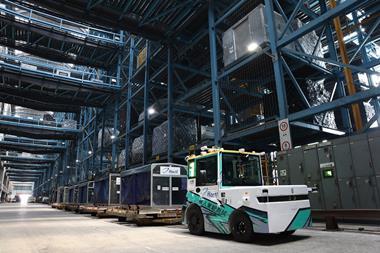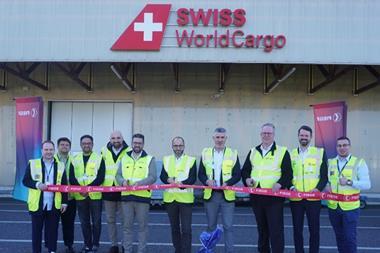
The UK's four main handling companies have warned that their operations at the UK's airports could grind to a halt in weeks as the sector faces collapse.
Swissport, dnata, Worldwide Flight Services and Menzies have written to the UK government to ask for financial support as they face up to the impact of airline service cuts — they explain that currently more than 95% of flights are not operating, meaning they are not being paid.
Meanwhile, John Menzies (parent of Menzies) has announced it will cut job numbers by 17,500 - more than half its total workforce at 200 airports - as it has seen the number of flights it handles drop by 60% in the past two weeks and cargo volumes are down about 20%.
In the letter seen by Air Cargo News, the companies warn that without urgent support they are unlikely to be able to continue operations across the country throughout the crisis period.
"We are requesting urgent dialogue between the government and our industry, regarding the support needed to ensure continued operational cashflow and secure employment for as many staff as possible," they write.
"Without our services and these dedicated teams, the airport infrastructure in the UK would grind to a halt for up to four months and it would take even longer to fully recover once the initial crisis is over. This is something we clearly have a common interest in working together to avoid.
"Ground handlers are not represented by the main UK airline or airport operators’ industry associations. We have therefore not been included in any dialogue with the aviation sector held so far.
"This is quite simply the biggest crisis ever faced by our industry."
The ground handling industry provides 90% of cargo and passenger handling at all UK airports and essential services like the handling and security processing of cargo and aircraft fuelling.
"Without these services, aviation as a whole cannot function, and supply chains will collapse," the companies said.
There is currently an ongoing consultation between UK freight companies and all of the government’s transport ministers, as well as with members of parliament representing areas with large regional airports.
However, airlines have had their calls for a bailout turned down. Instead, they have been told they should seek other forms of funding first and that the government will only step in as a last resort on an individual basis.
Craig Smyth, chief executive of Worldwide Flight Services, said: "Our message to the UK Government could not be clearer or more urgent. Support and immediate action is needed now to maintain the UK’s cargo (and passenger) airport handling capability to ensure cargo supply lines can continue to operate at this time of national and international crisis, and for cargo and passenger airport handling services to be resilient and sustainable after the Covid-19 crisis has passed.
"This is a situation we are anxious to avoid but, amidst all this uncertainty, we cannot continue to play the vital role we do in the nation’s economy and well being without Government help.
"Without this immediate support, even when Covid-19 is defeated, UK trade will continue to suffer long-term disruption because a major part of the supply chain infrastructure at UK airports needed to fuel the country’s recovery will have been shut down — and this will take many months to re-establish."
While the industry has welcomed the Chancellor’s work retention package, low margins and staff comprising 70% of costs mean that the viability of the industry remains immediately unsustainable.
Jason Holt, chief executive of Swissport for Western Europe, said: “As an industry we strongly welcome the Chancellor’s large-scale work retention package. Helping protect our employees and their jobs is a paramount concern of ours.
“However, even with this assistance, the aviation industry remains in crisis. And in light of the Chancellor’s recent letter to the sector, I have profound doubts that the fundamental challenges for the industry, both now and in the future, are being addressed.
“Without immediate support with taxation and charges, operational flexibility, and the flow through of the Chancellor’s announcement from last week into actual cash funding to support our workforce, we are perilously close to collapse.”
The ground handling industry will be working with HMRC to access funds committed by Government but are calling for further support, specifically through:
- The relaxation of the eligibility requirements for either the Business Interruption Loans Facility or corporate finance loans offered by the Government.
- A holiday from PAYE (income tax) and national insurance for both employees and employers, together with business rates relating to the significant number of premises they utilise.
- To respect social distancing and the furloughing of their teams, they are calling for a practical six-month extension to the Civil Aviation Authority’s regulations requiring all staff to receive retraining every two years.
“The aviation system is a triangle of airlines, airports, and ground handling businesses. Without cargo and ground handling companies, international supply chains will stop functioning during the Covid-19 pandemic and recovery” added Holt.
“Our thousands of employees are keeping goods and parts moving safely and securely during the Covid-19 pandemic and will be integral to the recovery of airlines and airports once the initial crisis concludes.
“The ground handling industry is robust and competitive in normal times. We have chosen to come together as one voice in these extraordinary circumstances to ask that we be given the essential and urgent support we need to ensure planes can continue to fly.”
In the letter, the companies also warn that the more staff we lay-off, the greater the challenge we will face in servicing the bounce-back and corresponding national economic recovery.
"On average it takes 1-3 months to hire, train and badge new staff, and there is currently minimal transferability between airports.
"There is therefore a strong business interest in maintaining existing workforce. Not to mention the desirability of avoiding unnecessary layoffs more generally."















